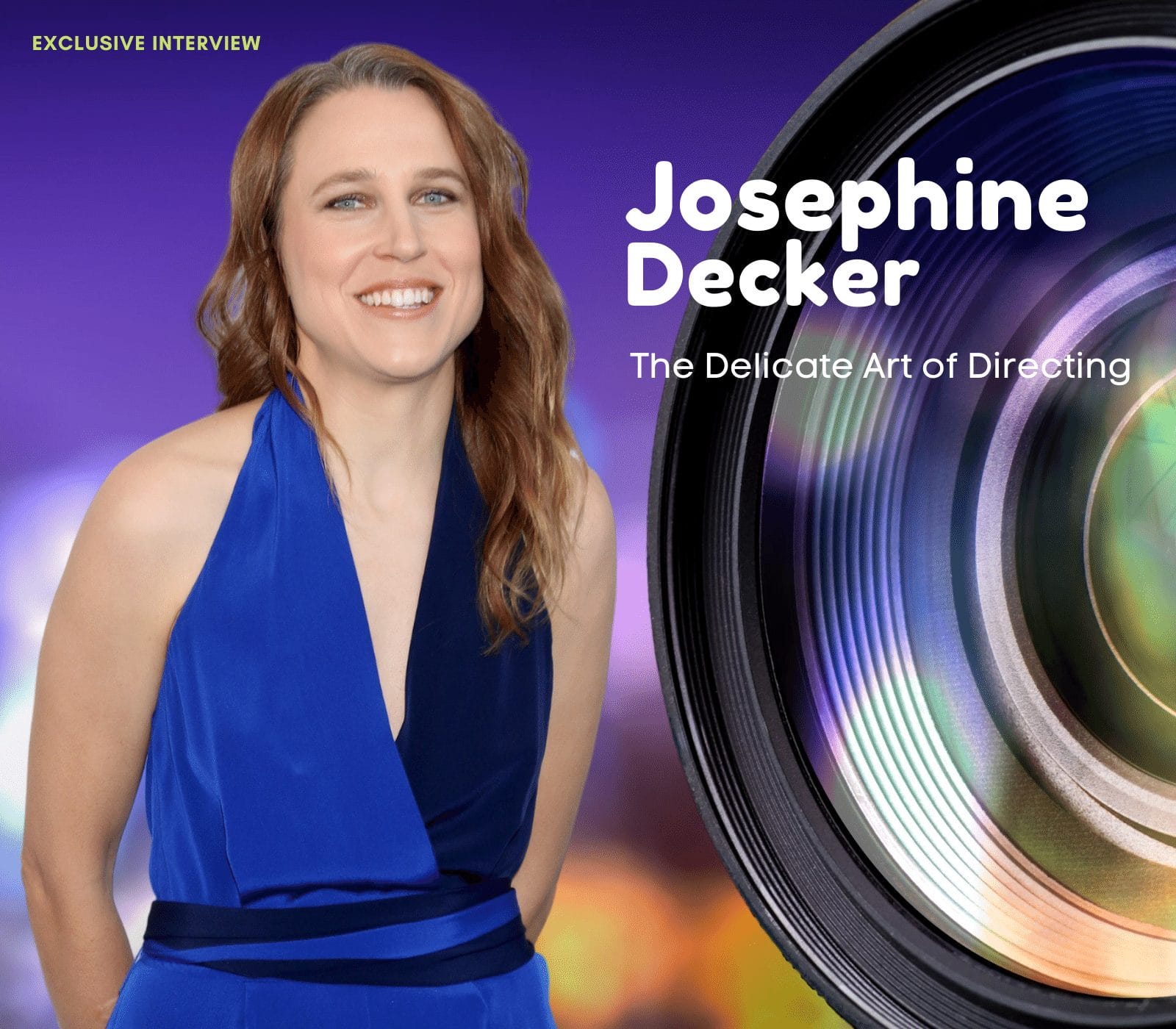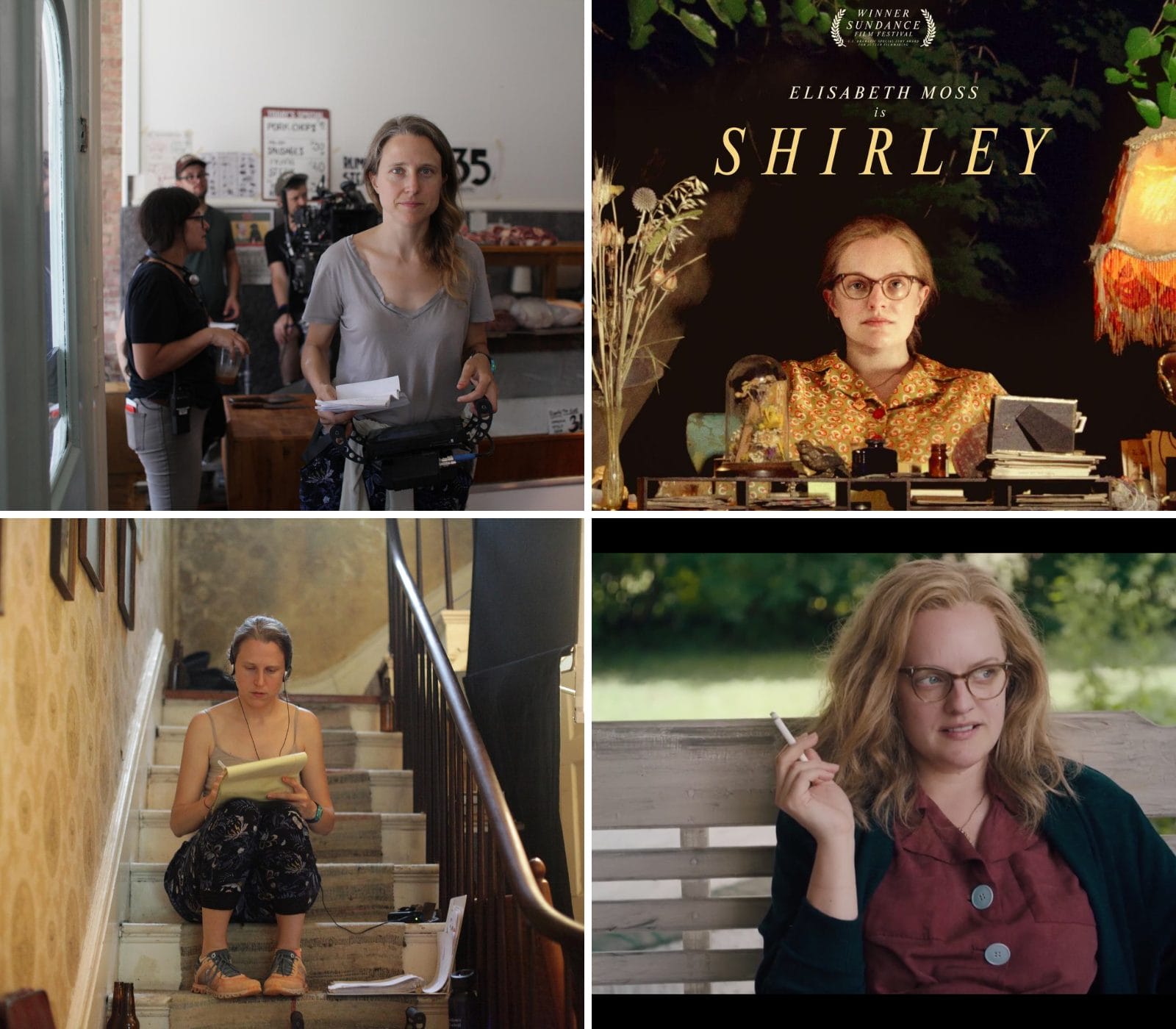Josephine Decker: The Delicate Art of Directing

Josephine Decker is an American actor, filmmaker, and performance artist whose latest work, Shirley, premiered and won awards at Sundance.
An Interview with Josephine Decker – The Delicate Art of Directing
Josephine Decker has directed four feature films: the experimental psychological thriller Butter on the Latch (2013), the experimental erotic thriller Thou Wast Mild and Lovely (2014) both premiered at the 2014 Berlin International Film Festival; also the experimental drama Madeline’s Madeline (2018), and the semi-biographical thriller Shirley (2020). She also explores collaborative storytelling via T.V. directing, documentary making, performance art, accordion playing, acting, teaching, and leading artist residencies with the School of Making Thinking.
She also co-directed the documentary Bi the Way (2008) with Brittany Blockman. The Movie Madeline’s Madeline, Josephine’s previous film, premiered at the 2018 Sundance Film Festival and Berlin film festival in early 2018 and was nominated for best picture at Independent Filmmaker Project’s Gotham Awards and for two Film Independent Spirit Awards
Josephine is also an actress in many independent films, including Joe Swanberg’s Uncle Kent, Onur Tukel’s Richard’s Wedding, Saturday Morning Mystery, the romantic tragedy Loves Her Gun, and Stephen Cone’s critically lauded drama film Black Box in 2013. In November 2015, Josephine Decker served on the Jury of the 33rd Torino Film Festival. The Italian festival had already paid tribute to her work in the Onde section of the 2014 edition.
In her most recent film, Shirley, released in June by Neon, premiered in the U.S at Dramatic Competition at Sundance, where it received the Special Jury Award for Auteur Filmmaking.
OMTimes was fortunate to sit down with Josephine Decker to talk about her new movie, Shirley, her career, her art, and her dreams.
Liane Buck: So, let’s start with the first question What moved you to create this non-biotic movie based on one of the many versions of the real person of the writer Shirley Jackson? What tickled you to create this movie?
Josephine Decker: Yes. Well, the script was written by Sarah Gubbins, and I was really attracted to it. She’d written a terrific script, and I didn’t know that much about Shirley’s real life at the time. I had read her fiction, and so really, the main reason I wanted to work on it was the chance to go deep into Shirley’s writing and try to create a film that felt like you were entering a Shirley Jackson story.
Liane Buck: That’s interesting. The movie is like seeing a corresponding reality, and you see the people. You see, they’re living their lives, but there is a network of things working in the parallel existence that’s overflowing. So, how do you classify? I know you’re incredibly creative. You have your own voice, and I actually took the liberty and saw your other movie. I noticed that you wear the language, something about the way you direct things. The eye of the observer. How would you classify your artistic genre, your style of directing? Shirley is a noteworthy movie, while it is a work of fiction, a non-biopic creation. At the same time, it seems to have a Documovie vibe. Why is that?
Josephine Decker: You know, I think I really prioritize performance. I think I love being in the moment with the actors and so I have chosen a method – at least for my last film – of directing that allows me to be very present with them. It means giving the Cinematographer a lot of freedom to be performing with the actors and moving with them, being in conversation with them so that the camera, and the eye through which you’re seeing the film, is breathing and is filled with life and is responsive to the environment. That was, I think, a big contributor to why my films feel the way they do. Because, otherwise, it’s really just trying to hire really wonderful people and let them do what they do really well and let them teach me in a way. I love to learn from my co-workers and be incredibly open and collaborative with them so that they can kind of fill the movie with their vision, too. So, it’s really a process of conversation, I guess, it’s my style of directing.
Liane Buck: It seems that all the independent movies are always in a constant process of flow, of unfolding, of improving and of endless editing (Of course, it must be a nightmare when you edit). How do you know when a project is done? Do you have guidelines or rules for that, or do you or play by ear?
Josephine Decker: On previous films – oh, my gosh – I would just torture myself, and I could go on forever and ever. In this film, we had a deadline that was defined by not me but by the producers. They were very flexible, so I think the deadline was the right deadline. It was kind of the time when the audience was doing a lot of test screening. It was kind of when people seemed to feel that their experience of watching the film – they were “I don’t know how you could improve this” – and stopped having notes. That was a good thing.
Liane Buck: Most of your films have a theme of the dance between Light and Darkness. In Shirley, we have a very instinctual motion picture, madness and seduction seem to be the shadow dance. I think the most horrifying and seductive aspect of the movie is that the audience cannot pinpoint the level of manipulation because all the characters are so profoundly and eccentric deceiving: Can you talk a bit about this element of strangeness and Loneliness of every character?
Josephine Decker: Well, some of that we try to bring out on set when we’re shooting. We’ll do a lot of work, seeing if the presence of the actors can find their own spontaneous and unpredictable performances. But, then, also actually go into the edit. In the edit, we try to really refine the performance that happened in front of the camera. Then there’s the performance that’s put together in the edit, and in the edit, what we’re trying to do is choose maybe the most unpredictable way of putting together the scene so that you kind of don’t know what’s going to happen next. But it feels that you’re always excited to see what could happen next, so it’s not random. It doesn’t feel like so crazy what you’re seeing, but there’s a level of unpredictability that also feels inevitable. You have to bring those two things together and allow your characters to be very much themselves. Also, be unpredictable so that the viewer is excited to see what could happen next.
Liane Buck: That’s for sure. Most of your movies are very feminine. The energy of the feminine is powerful, and the womanly in all aspects, all those nuances, all the degrees are spherically feminine. Based on that, would you say that the female and male characters are alike in some ways? Despite their societal and age differences, both are like notes in a symphony, because the movie plays a lot like music: a symphony of Loneliness, of invisible women. They’re undervalued and, in a way, tormented and haunted. What are the similarities between those two characters?
Josephine Decker: Yes. Well, you know what’s interesting, we tried to have the two characters really reflect the characters in Shirley’s own writing. When Shirley writes, she often has two female characters, one of whom is sort of misanthropic. One character has a terrific sense of humor and is brilliant. The other is, in a way, conforming to societal expectations. She’s good at baking, very generous, human, has a light spirit, gets on well with men. Her Biographer talks about this kind of dynamic of these two quite different female characters. In a lot of Shirley’s work, as being two sides of her own consciousness that Shirley was working with, and these women blend into one person. So, in a way, I think they are very different on the outside and the inside. I think what you’re picking up is that they’re very similar. We even tried to work with the costumes and makeup to sort of seeing that where Shirley starts in the movie, kind of disheveled and unable to get out of bed, is where Rose is towards the end of the film when she’s just had her baby. She totally hasn’t brushed her hair in a month and can’t leave the house. They flip-flop places. They have something inherently in the center of them that’s similar.
Liane Buck: How was your experience in selecting the actors that would portray such rich and densely disturbed characters? Are you peculiar in your process of choosing them, what do you first look for in an actor/ actress? How do you pick them? Is there anything unique that you look for, or do you have a wish list?
Continue to Page 2 of the Interview with Josephine Decker
Creatrix from Sirius. Fairly Odd Mother of Saints (Bernards). Fish Tank aficionado by day ninja by night. Liane is also the Editor-in-Chief of OMTimes Magazine, Co-Founder of Humanity Healing International and Humanity Healing Network, and a Board Member of Saint Lazarus Relief Fund.






